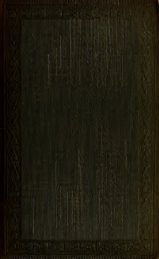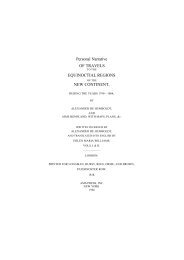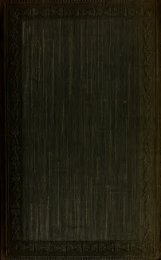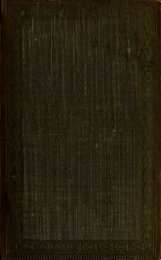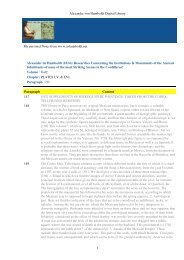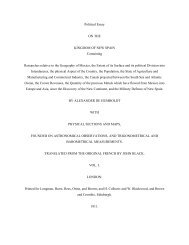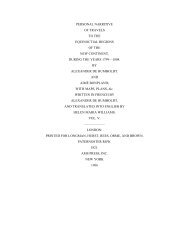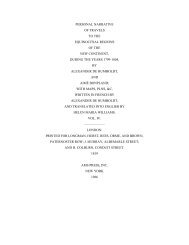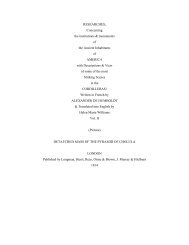See the complete document here
See the complete document here
See the complete document here
You also want an ePaper? Increase the reach of your titles
YUMPU automatically turns print PDFs into web optimized ePapers that Google loves.
130 COSMOS.<br />
glass-wares, tissues, and purple dyes, necessarily led to advancement<br />
in ma<strong>the</strong>matical and chemical knowledge, and<br />
"<br />
more particularly in <strong>the</strong> technical arts. The Sidonians/'<br />
writes Strabo, " are described as industrious inquirers in as-<br />
tronomy, as well as in <strong>the</strong> science of numbers, to which <strong>the</strong>y<br />
have been led by <strong>the</strong>ir skill in arithmetical calculation, and<br />
in navigating <strong>the</strong>ir vessels by night, both of which are indis-<br />
pensable to commerce and maritime intercourse."^ In order<br />
to give some idea of <strong>the</strong> extent of <strong>the</strong> globe opened by <strong>the</strong><br />
navigation and caravan trade of <strong>the</strong> Phoenicians, we will<br />
mention <strong>the</strong> colonies in <strong>the</strong> Euxine, on <strong>the</strong> Bithynian shore<br />
(Pronectus and Bithynium), which were probably settled at a<br />
very early age <strong>the</strong> ; Cyclades, and several islands of <strong>the</strong> ^gean<br />
Sea, first known at <strong>the</strong> time of <strong>the</strong> Homeric bard ; <strong>the</strong> south<br />
of Spain, rich in silver (Tartessus and Gades) ; <strong>the</strong> north of<br />
Africa, west of <strong>the</strong> Lesser Syrtis (Utica, Hadrumetum, and<br />
Carthage) ;<br />
<strong>the</strong> tin and amber lands of <strong>the</strong> north of Europe ; j<br />
* Strabo, lib. xvl., p. 757.<br />
t The locality of <strong>the</strong> " land of tin" (Britain and <strong>the</strong> Scilly is<br />
Islands)<br />
more easily determined than that of <strong>the</strong> " amber coast ;" for it appears<br />
very improbable that <strong>the</strong> old Greek denomination KaaaiTspog, which<br />
was already in use in <strong>the</strong> Homeric times, is to be derived from a<br />
mountain in <strong>the</strong> southwest of Spain, called Mount Cassius, celebrated<br />
for its tin ore, and which Avienus, who was well acquainted with <strong>the</strong><br />
country, placed between Gaddir and <strong>the</strong> mouth of a small sou<strong>the</strong>rn<br />
Iberus (Ukert, Geogr. der Griechen vnd Romer, <strong>the</strong>il ii., abth. i., s. 479).<br />
Kassiteros is <strong>the</strong> ancient Indian Sanscrit word kastira. Dun in Icelandic<br />
; zinn in German ; tin in English and Danish; and tenn in Sw^edish,<br />
ai'e rendered, in <strong>the</strong> Malay and Javanese language, by timah ; a<br />
similarity of sound which calls to mind that of <strong>the</strong> old German word glessum<br />
(<strong>the</strong> name applied to transparent amber), with <strong>the</strong> modern German<br />
glas, glass. The names of wares and articles of commerce pass from<br />
one nation to ano<strong>the</strong>r, and into <strong>the</strong> most different families of languages.<br />
Through <strong>the</strong> intercourse which <strong>the</strong> Phcouicians maintained with <strong>the</strong><br />
eastern coast of India, by means of <strong>the</strong>ir factories in <strong>the</strong> Persian Gulf<br />
<strong>the</strong> Sanscrit word kastira, which expressed so useful a product of<br />
Fur<strong>the</strong>r India, and still exists among <strong>the</strong> old Aramaic idioms in <strong>the</strong><br />
Arabian word kasdir, may have become known to <strong>the</strong> Greeks even<br />
before Albion and <strong>the</strong> British Cassiterides had been visited (Aug. Willi.<br />
V. Schlegel, in <strong>the</strong> Indische Biblio<strong>the</strong>k, bd. ii., s. 393; Benfey, Tndien,<br />
s. 307; Pott, Etymol. Forschungen, th. ii., s. 414; Lassen, Indische At<br />
tertkumskund^, bd. i., s. 239). A name often becomes a historical monument,<br />
and <strong>the</strong> etymological analysis of languages, however it may bo<br />
derided, is attended by valuable results. The ancients were also acquainted<br />
with <strong>the</strong> existence of tin—one of <strong>the</strong> larest metals— in <strong>the</strong><br />
country of <strong>the</strong> Artabri and <strong>the</strong> Callaici, in <strong>the</strong> northwest part of <strong>the</strong><br />
^berian continent (Strabo, lib. iii., p. 147 ; Plin., xxxiv., c.<br />
16), which<br />
v/as nearer of access than <strong>the</strong> Cassiterides (CEstiymnides of Avienus),<br />
from <strong>the</strong> Mediterranean. When, before embarking for <strong>the</strong> Canaries,<br />
I was in Galicia in 1799, mining operations, although of veiy inferioi



